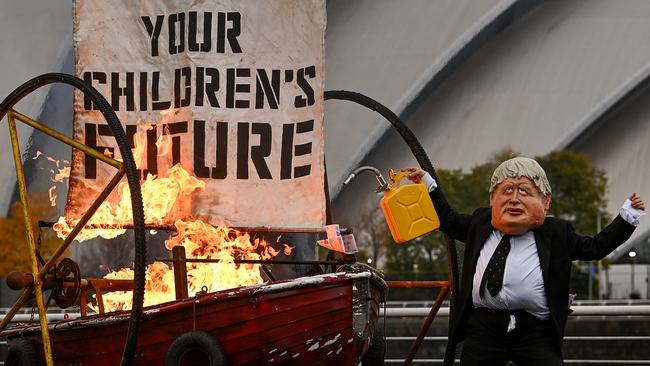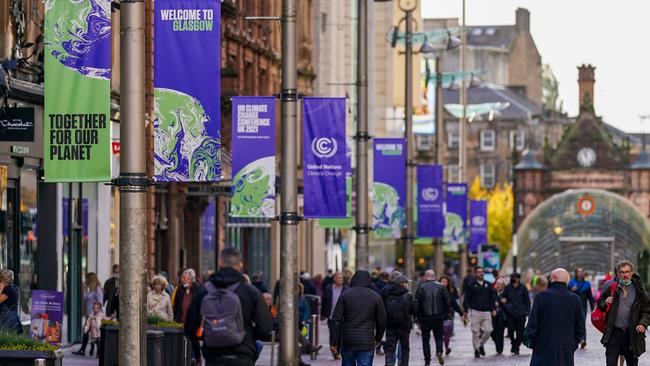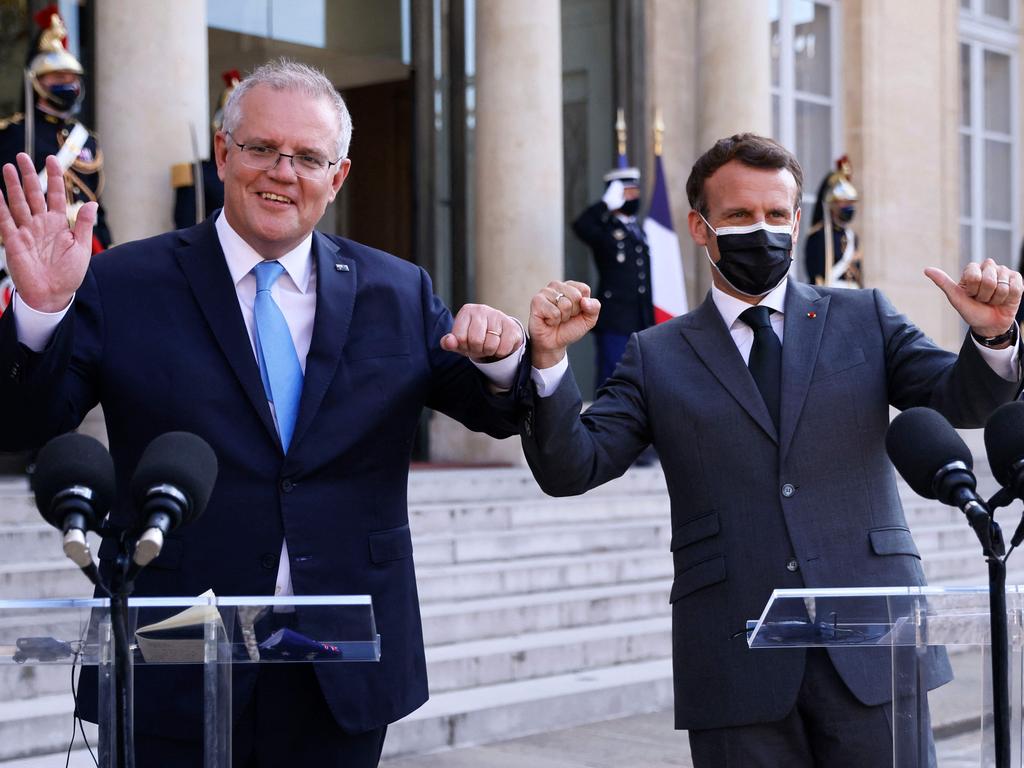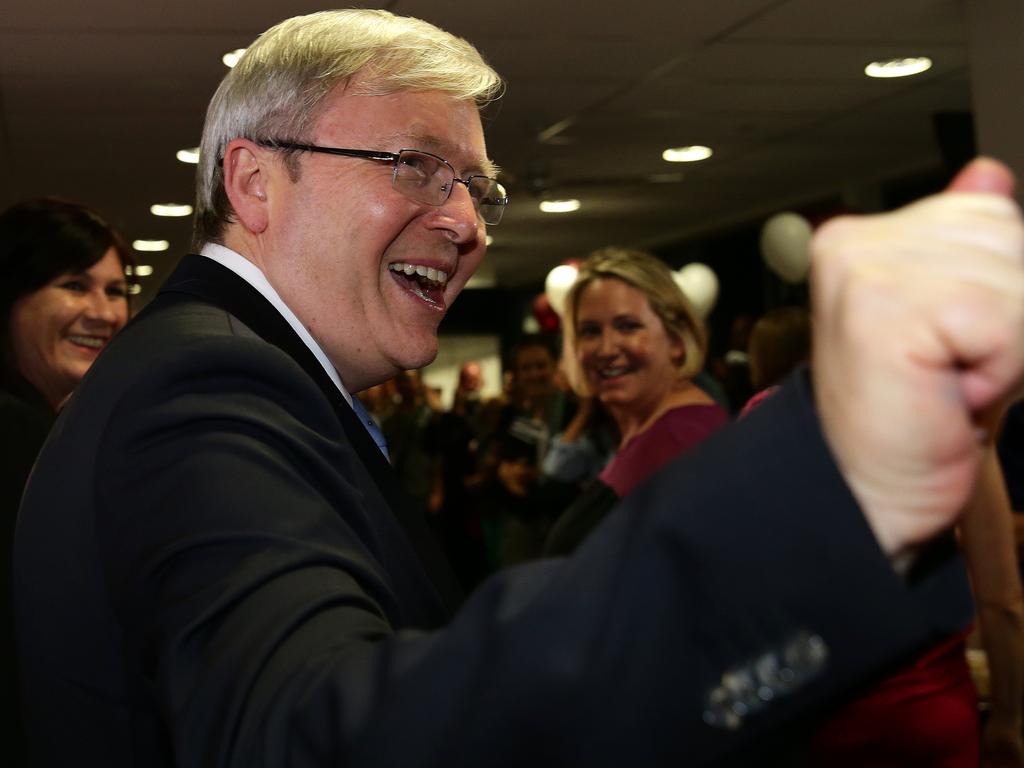Fantasy climate policies promise a Utopian outcome
As attention turns to Glasgow, it’s time to face the fact the wool has been pulled over our eyes.

Will the summer scourge of bushfires be a thing of the past? Will floods, storms and sea surges never destroy our communities again?
Will our dams always be full, and our rivers never run dry?
Will our crops always be abundant and our cities never too hot or too cold?
Will there be a discernible difference in any of these realities? Will our carbon dioxide emission reductions improve our lives or our environment in any way?
If none of these benefits are expected, why do activists and politicians constantly cite these natural occurrences as a justification for action? If they cannot guarantee improvements, how can they justify action?
None of this is addressed in our public debate, and to ask such inconvenient questions is to be branded a climate denier or receive some other inane slight.
The global warming debate involves a complex array of multidisciplinary scientific data, theory and forecasts – and the potential policy responses range into myriad intricacies around energy, economics, agriculture, ecology, science, infrastructure and more – yet the debate lacks intelligent, factual approaches.
We are supposed to adopt drastic action, whatever the cost, and without any assurances it will lead to any beneficial outcomes.
We are asked to swim like lemmings. We are bombarded with propaganda where bushfires, floods, storms and droughts are branded “unprecedented” with little or no facts to back up the claim.
Seldom are the claims tested, and often they are wrong.
Take the 2019-20 bushfires (to prove my point; they now call them megafires) which are often described as “unprecedented”. Well, everything is unprecedented in a narrow sense.
Ever since European settlement, Australia has had many deadlier bushfires, (most recently in 2009 and 1983); we have had bushfire seasons burn greater areas; all the damaged regions had burned previously; and the timing of the fires was not new either. The only unprecedented aspect was that a tragic bushfire season coincided with a highly politicised climate debate.
The Bureau of Meteorology feeds out media releases about broken temperature records, often without volunteering how they rely on revising earlier records downwards. Back in January 2019, the BOM proudly proclaimed a record as Adelaide reached 46.6 degrees, the highest maximum recorded in any of our capitals – except that it was not. Back on January 12, 1939, Adelaide recorded a maximum a full degree higher, but it had been revised downwards by the BOM’s homogenisation of temperature records.
There is too little scrutiny and too little transparency around much of this – such facts should need no censorship or embellishment. Like the pandemic, climate change is an issue where the fearmongering of politicians melds perfectly with the unquestioning sensationalism of some media.

Questioning whether climate policies will be effective is now akin to trying to play cricket without taking a knee. You must not think for yourself or try to reconcile costs against benefits.
Incredibly, it is considered sacrilege to ask whether getting to net-zero emissions is possible, how much it will cost, or whether it will make any difference; even though proponents offer next to nothing by way of estimates.
We are told we simply must adopt these policies because if everyone failed to act, we would cook the planet.
So, relentlessly, we pursue a path of absolute uncertainty on costs, practicality and effectiveness – an insane policy path. The only justification provided, without any factual basis or numerical explanation, is that the cost of doing nothing would be higher.
This intellectually callow, politically puerile and practically frightening proposition was put by Labor at the last election, enabling them to lose what many thought was the unlosable election. Bizarrely, the same arguments are now being made by the Coalition government, sacrificing their values and practical disposition on the altar of climate conformity.
What rising of mainstream angst has wrought this dramatic about-face, you might ask? What awakening among the communities and families of middle Australia who usually support right-of-centre parties has pushed the Liberals and Nationals into this reversal? The sad and disturbing answer is; nothing. The shift has not come from the grassroots or from the public; it has come from outside.
It has come from the United Nations; the Europeans; the United States; even Chinese communists who are punishing us with trade sanctions; it has come from big business, corporate financiers and capital markets. Even progressives normally would argue against allowing such bodies or sectional interests to frame our national interests or dictate our domestic policies.
Those pushing net zero might be right, and they might be wrong. But voters get little choice because both sides of politics have now acquiesced.
The pandemic has shown us how wildly inaccurate modelling can be; and climate models rely on less hard data and more variables than the epidemiological modellers. Reality is a better guide than forecasts.
The past two decades tell us the latest net-zero policies will lead to higher electricity costs and less reliable power supplies. Taxpayer grants and subsidies will increase, more jobs will move offshore, China will continue to enrich itself from our resources while not reducing its emissions, and global emissions will continue to increase, so that all of our pain will be for no gain. But on the upside, as a nation we will have taken a knee to the climate gods. In a field where people like to talk about intergenerational responsibilities, we could leave a terrible burden of costs, missed opportunities and relative economic weakness for our children.
It is too soon to judge the electoral repercussions of all this. While Scott Morrison and Barnaby Joyce will have dismayed large sections of the electorate and squandered a huge policy advantage over Labor and the Greens, there are many other factors that might encourage their supporters to hold their nose and tick the Coalition box.
Not least of these is that at the election Australia will be one of the world’s most vaccinated nations, with one of the lowest pandemic fatality rates and having suffered some of the least economic damage. Having marshalled the country through the pandemic, Morrison will be able to mount a strong case that voters should stay the course.
Still, whoever wins, we face a deepening of our energy upheaval. Labor and the Coalition both promise to further erode our once crucial economic advantage of cheap and plentiful energy.
It is unfathomable that we should end up here after all we have seen domestically, in Europe and in China. That we have signed on to this emissions-reduction crusade without championing nuclear energy at home or abroad just underscores how this is playing out as an issue of symbolism and morality rather than practical outcomes.
For all the complexities, proponents of climate action want this debate to be a zero-sum game. The activists present two simple propositions, and they have been highly successful in having them adopted by politicians, media and the public.
When it comes to the threat, they say global warming is bad and will visit catastrophe upon us, any benefits are either denied or ignored. So we are left with the absurd presumption that in all the varying and evolving climatic, ecological and geographical history of the planet, the global average temperature, shorelines and environment that existed in 1990, or perhaps 2005, were deemed to be optimal.
When it comes to solutions, there is an obsessive focus on reducing carbon dioxide emissions from industrial processes, preferably with renewable energy or deindustrialisation rather than through hi-tech responses. This must occur in wealthy countries rather than in those with the highest emissions, and it should involve a significant transfer of wealth to poorer nations.
Net zero by 2050 is held out as our salvation. In Australia, we might still love our country, but it would no longer be sunburnt; apparently we would keep our sweeping plains and ragged mountain ranges but skip the droughts and flooding rains.
If this is not what the climate activists claim, then why do they us all weather events to press their case? Are they offering a Truman Show-world of contrived and controlled weather?
This mindset is dangerous because it insinuates the wrong responses. It would be madness, for instance, to suggest climate policies – rather than large, cleared areas – can protect people and houses from the inevitability of bushfires.
The superficiality of the debate is borne out in opinion surveys showing most voters support an energy mix of 100 per cent renewables plus storage – something that is simply impossible to deliver. We now have fantasy policies promising fantasy results to deliver us into nirvana.
We must not question this because the alternative is face even higher costs and/or destroy the planet. We have bipartisan agreement on the most costly and radical economic and social policy agenda ever envisaged with no guarantee of beneficial outcomes and based on the flimsiest of public debates – we might well have passed our evolutionary peak.





